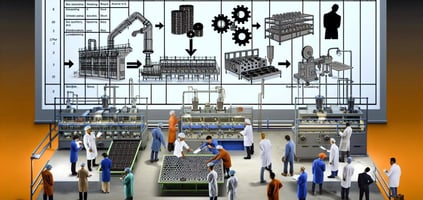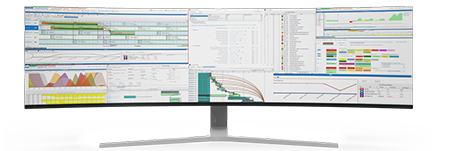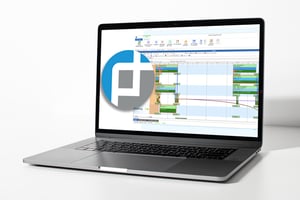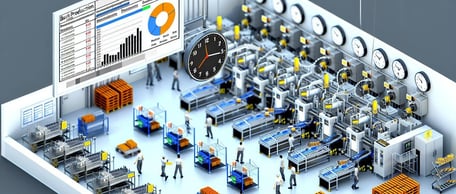Approaches to Batch Production Scheduling
Efficient batch production scheduling is essential for optimizing processes, reducing costs, and ensuring on-time delivery of products. Plant Managers play a crucial role in overseeing the production process, and their decisions can greatly impact the bottom line. One of the key tools that can help Plant Managers streamline batch production scheduling is PlanetTogether, a robust production planning and scheduling software.
In this blog, we will explore various approaches to batch production scheduling, with a particular focus on the integration of PlanetTogether with popular ERP, SCM, and MES systems like SAP, Oracle, Microsoft, Kinaxis, Aveva, and others.

The Importance of Batch Production Scheduling
Batch production scheduling involves planning and managing production runs of multiple products with common characteristics. This approach is commonly used in industries such as pharmaceuticals, food and beverage, chemicals, and more. Efficient batch production scheduling offers several benefits, including:
Optimized Resource Utilization: Proper scheduling ensures that equipment, labor, and materials are utilized efficiently, reducing downtime and costs.
Reduced Lead Times: Effective scheduling minimizes waiting times, allowing for quicker order fulfillment and shorter lead times.
Enhanced Quality Control: Batch scheduling allows for better control over production parameters, leading to improved product quality and consistency.
Cost Reduction: By optimizing schedules and reducing waste, manufacturers can cut production costs and increase profitability.
Challenges in Batch Production Scheduling
While the benefits of efficient batch production scheduling are clear, achieving it can be a challenging task. Manufacturers often face several challenges:
Complexity: Batch production involves multiple parameters, including batch sizes, processing times, setup times, and material availability, making scheduling complex.
Variability: Changes in demand, machine breakdowns, and unforeseen disruptions can create scheduling conflicts.
Resource Constraints: Limited availability of equipment, skilled labor, and materials can impact scheduling decisions.
Data Integration: Integrating scheduling software with existing ERP, SCM, and MES systems is crucial for accurate scheduling but can be challenging.
![]()

The Role of PlanetTogether in Batch Production Scheduling
PlanetTogether is a leading production planning and scheduling software that offers advanced features to address the challenges of batch production scheduling. It provides:
Real-time Visibility: PlanetTogether offers real-time visibility into production schedules, enabling Plant Managers to make informed decisions.
Scenario Analysis: It allows users to run "what-if" scenarios to evaluate the impact of different scheduling decisions on resource utilization and production outcomes.
Optimization Algorithms: The software utilizes optimization algorithms to generate efficient production schedules while considering resource constraints and objectives.
Integration Capabilities: PlanetTogether can be seamlessly integrated with various ERP, SCM, and MES systems, enabling data flow and synchronization.

Approaches to Batch Production Scheduling with PlanetTogether
Standalone Usage
In this approach, Plant Managers can use PlanetTogether as a standalone tool for batch production scheduling. They input relevant production data into the software, and it generates optimized schedules based on the given parameters. While this approach offers improved scheduling compared to manual methods, it may lack real-time data integration with other systems.
Integration with ERP Systems
Integrating PlanetTogether with ERP systems like SAP, Oracle, or Microsoft Dynamics provides a holistic view of the production process. Data regarding customer orders, inventory levels, and production capacities can be synchronized with the scheduling software. This allows for more accurate scheduling and better responsiveness to changes in demand.
Integration with SCM Systems
Supply Chain Management (SCM) systems play a crucial role in managing the flow of materials and information across the supply chain. Integrating PlanetTogether with SCM systems enhances visibility into the availability of raw materials and components. This integration ensures that production schedules are aligned with the availability of inputs, reducing delays and stockouts.
Integration with MES Systems
Manufacturing Execution Systems (MES) provide real-time data from the shop floor, including machine status, production progress, and quality control information. Integrating PlanetTogether with MES systems enables Plant Managers to make scheduling decisions based on real-time shop floor data, improving overall production efficiency.
Integration with Kinaxis, Aveva, and Other MES Systems
PlanetTogether's flexibility allows it to integrate with a wide range of MES systems beyond the popular ones mentioned earlier. The choice of MES system integration depends on the specific needs and technologies used by the manufacturing facility.

Best Practices for Successful Integration
To achieve the best results when integrating PlanetTogether with ERP, SCM, and MES systems, Plant Managers should consider the following best practices:
Clearly Define Objectives: Determine specific goals for integration, such as reducing lead times, increasing resource utilization, or improving on-time delivery.
Data Accuracy: Ensure that data inputs into PlanetTogether are accurate and up-to-date to generate reliable schedules.
Regular Updates: Schedule regular updates and synchronization between the scheduling software and integrated systems to account for changing conditions.
User Training: Train relevant personnel on how to use PlanetTogether effectively and interpret the generated schedules.
Continuous Improvement: Continuously monitor and analyze scheduling results to identify areas for improvement and optimization.
Efficient batch production scheduling is a critical aspect of industrial manufacturing, and integrating PlanetTogether with ERP, SCM, and MES systems offers a powerful solution to this challenge. Plant Managers can leverage the capabilities of PlanetTogether to generate optimized schedules, reduce costs, improve resource utilization, and enhance overall production efficiency.
By following best practices and embracing modern scheduling technologies, industrial facilities can stay competitive in a rapidly evolving manufacturing landscape.
Are you ready to take your manufacturing operations to the next level? Contact us today to learn more about how PlanetTogether can help you achieve your goals and drive success in your industry.
Topics: Industrial Manufacturing, Real-Time Data, Real-time Visibility, PlanetTogether Software, Integrating PlanetTogether, Optimization Algorithms, Integration Capabilities, Dynamic Scenario Analysis




















LEAVE A COMMENT